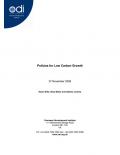Climate change is now widely acknowledged as one of the great – if not the greatest – challenges facing humanity in the coming decades. Through its impact on average temperature, precipitations and sea levels, it will endanger the livelihood of hundreds of millions and impose increasing costs on our societies if nothing is done.
It is becoming increasingly clear that the only way to get the sort of commitments needed to effectively deal with the challenge is to create a global consensus that involves all stakeholders. Such a consensus will only arise if there is a seemingly “just” sharing of the burden in this battle to keep the planet hospitable to human beings.
This is particularly true when it comes to employment. It goes without saying that climate change and policies to mitigate it will in time have an enormous impact on industries, jobs and workers. Yet, despite the rhetoric about the elusive “social dimension” of sustainable development, until very recently climate change negotiations showed only limited concern about the fate of workers, and far greater efforts were directed at measuring the environmental rather than the social impacts of climate change.
This paper examines the processes used in the United States and Mexico to assess the economic costs and benefits of environmental improvement, the kinds of information obtained from these procedures, and the additional knowledge that is needed about both elements to improve understanding of the problems and prospects of advancing a green growth agenda. Because environmental and other development needs are large and resources are limited, it is important to choose the best projects, those with the highest returns on both public investments and private resources harnessed by regulation. The United States is a well-recognized leader in the use of quantitative methods to evaluate options for environmental regulation and policy. Mexico represents a case where a country has made clear advances in reforming its economy and in introducing transparency in its regulatory processes for environmental and other policy areas.

This report is the first comprehensive study on the emergence of a “green economy” and its impact on the world of work. It includes data that shows a changing pattern of employment in which green jobs are being generated in many sectors and economies around the world as a result of measures to tackle climate change and to reduce emissions of greenhouse gases. This has also led to changing patterns of investment flows into areas such as renewable energy and energy efficiency at the household and industrial level. Within current policy frameworks, only a fraction of the potential benefits for jobs and development is forthcoming.
